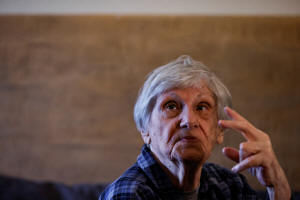Holocaust survivor finds refuge from Ukraine war in Poland
 Send a link to a friend
Send a link to a friend
 [January 26, 2023]
KRAKOW, Poland (Reuters) - Iya Rudzitskaya, a 92-year-old
Ukrainian Jew, has fled Kyiv twice. First, in 1941, when she was just 10
years old and German bombs started falling on the then Ukrainian Soviet
Socialist Republic. The second time came last year, when Russia invaded
Ukraine on Feb. 24. [January 26, 2023]
KRAKOW, Poland (Reuters) - Iya Rudzitskaya, a 92-year-old
Ukrainian Jew, has fled Kyiv twice. First, in 1941, when she was just 10
years old and German bombs started falling on the then Ukrainian Soviet
Socialist Republic. The second time came last year, when Russia invaded
Ukraine on Feb. 24.
"I did not believe that this could ever happen," said Rudzitskaya,
sitting in the small one-bedroom flat she shares with her son Artur in
the Polish city of Krakow.
"Earlier, the Germans were the enemy. But I don't understand the
Russians. They think that they are defending their country, they are
defending themselves, but they came to us. They have destroyed Kharkiv,
what do they need it for?"
Rudzitskaya slowly goes through family photos she took from Kyiv along
with some books, documents and basic necessities. She squints her eyes,
trying to find her young self in the pictures. Her sight is failing her,
but her memories are still vivid.
She was born in 1931 in a respectable Jewish family. Her grandfather,
Nuchim Waisblat, was the main Kyiv rabbi, her father, Vladimir, was a
writer and publisher of books by Ukrainian authors including Taras
Shevchenko, the founding father of Ukrainian literature.
When Germany invaded the Soviet Union in early July 1941, Rudzitskaya
woke up to the sound of bombs. As a young pioneer, the mass youth
organization of the Soviet Union, she was tasked with delivering summons
to young men to join the war.

But her father knew that as Jews they were no longer safe in Kyiv.
"He said in panic that we have no choice but to leave. But it was
already almost impossible. In July the panic was terrible, everyone who
could was fleeing: the Communists, Jews and all the others," Rudzitskaya
said.
Her parents took her and her brother and fled first to Kharkiv in
eastern Ukraine. From there, they travelled across the Soviet Union to
Tashkent, the capital of the Uzbek Soviet Socialist Republic, located
nearly 3,800 km (2360 miles) away from their hometown.
Rudzitskaya remembers they left Kharkiv on Sept. 21. On Sept. 29, the
Babyn Yar massacre took place. Within two days, Nazis murdered some
33,771 Ukrainian Jews, one of the biggest single massacres of Jews
during the Nazi Holocaust.
Russian shells struck close to the Babyn Yar memorial in March of 2022.
Friday Jan. 27 marks International Holocaust Memorial Day, on the
anniversary of the liberation of the Auschwitz concentration camp.
[to top of second column]
|

92-year-old Holocaust survivor and
Ukrainian refugee from Kyiv, Iya Rudzitskaya, gestures during an
interview in Krakow, Poland January 16, 2023. REUTERS/Kuba Stezycki

Rudzitskaya's family returned to Kyiv after the war. She got a job
as a typographist, got married and had her only son, Artur, 54.
When Russia invaded Ukraine, the two, with a help of a Kyiv
synagogue fled first to Moldova, then to Lithuania, where an
apartment was made available. But there were few job opportunities
there for Artur.
The American Jewish Joint Distribution Committee, or Joint, a Jewish
relief organization whose Kyiv branch was once headed by
Rudzitskaya's grandfather, invited them to Warsaw and then to
Krakow.
"TORN FROM EVERYTHING"
After passing through 10 different apartments since fleeing Kyiv,
Rudzitskaya and her son now have a flat for three months. From the
window they see a Russian flag hanging from the Russian consulate.
When you look the other way, the street looks like Kyiv, Rudzitskaya
said.
"I want to go home. Just go out and talk to my neighbours in the
language I understand," she said. "I had my own daily routine,
everything. And here I am torn out of everything."
She had a grave waiting for her in Kyiv, she said, next to her
parents.
"There is even a plaque with my name. You just need to add the last
digits and everything, everything will be in order."
In the 11 months since it invaded, Russia has killed thousands of
civilians, forced millions from their homes and reduced entire
cities to rubble.
It says its "special military operation" was necessary to stem a
security threat arising from Ukraine's ties to the West. Kyiv and
its allies say Ukraine never menaced Russia and the invasion is a
war of aggression to subdue a neighbour and seize land.
(Reporting by Agnieszka Pikulicka-Wilczewska; Editing by Alexandra
Hudson)
[© 2023 Thomson Reuters. All rights
reserved.]This material may not be published,
broadcast, rewritten or redistributed.
Thompson Reuters is solely responsible for this content.
 |